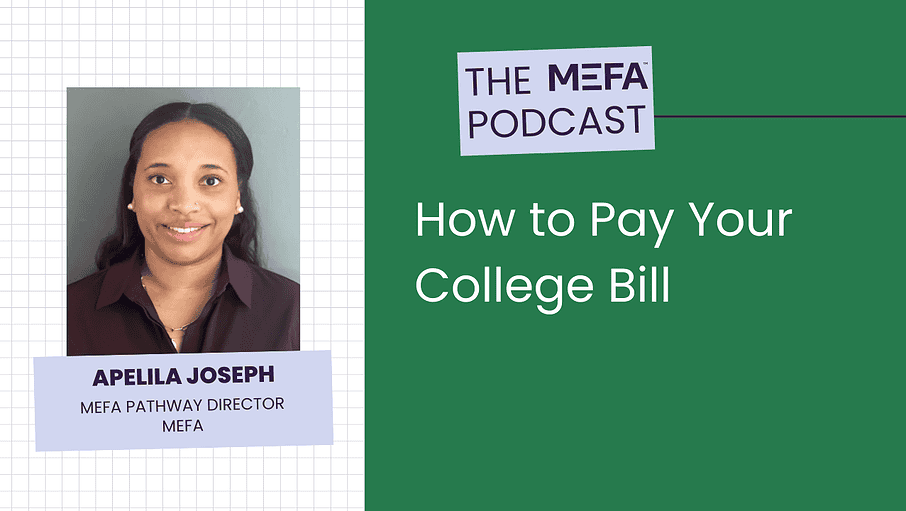

Resources Mentioned in this Episode
Jonathan Hughes: Hi everyone. And welcome to the MEFA Podcast. My name is Jonathan Hughes.
Julie Shields-Rutyna: And I’m Julie Shields-Rutyna.
Jonathan Hughes: And we have a great show for you today. Our guest is Apelila Joseph. She’s MEFA Pathway’s Program Manager, and a first time guest, because Apelila is in fact a new team member to MEFA, but she’s not a stranger to us.
She worked with us during her time at the Springfield Promise organization, which is based out of Springfield, Massachusetts. And one of the things that she did was to present on our series topic. This is our second episode in our series highlighting MEFA’s How to Pay for College: A Guide for Seniors and Their Families.
Now, last week we had MEFA’s Director of College Relations, Stephanie Wells, on the show to talk about what high school seniors and their families may see on their financial aid offers. So you can look for that episode in our feed, if you want to listen to that. But today Apelila will be talking about how families can actually pay for college once they know their balance due. But that is not all we have to talk about today. Is it, Julie?
Julie Shields-Rutyna: No, it isn’t. So we’re also going to highlight another part of MEFA’s How to Pay for College: A Guide for Seniors and Their Families. So last week we focused on the college cost calculator, a tool that’s housed on the website at mefa.org/how-to-pay-for-college.
And that allows families to calculate and compare their balances due at each college. So today we’re going to talk about a process that some families may encounter at this time called verification. So we explained verification more in our webinar presentation that you can also watch at mefa.org/how-to-pay-for-college.
And we’ll post a link for that in the show notes. But let’s talk about what verification is. Verification very simply is when a college asks the family or the student to supply documentation in order to verify the information they submitted on their financial aid applications.
Jonathan Hughes: Okay. So they’re looking for more information than they provided. And why might they be looking for more information?
Julie Shields-Rutyna: Well, just first of all, the federal government requires that a certain number of financial aid applications be verified so that they can just stay on top of the accuracy. And that helps them know if they need to change questions. If a certain question is always answered incorrectly then, you know, that helps them think about the form. So that’s one reason.
But another reason could be if something on a family’s application doesn’t make sense. So one example might be, if you say you made $30,000 in income in 2020, and then you also say you paid $30,000 in taxes. Well, that just doesn’t make sense. So a college may ask for more information about that.
Or sometimes if a family files both the FAFSA and CSS Profile® as financial aid applications to a college and something is different between the two forms. They just might want to clear that up. But again, this is not anything like a tax audit. Nobody’s looking to punish a family who made an error, a small error like that.
It’s just, they need to make sure the contradiction is resolved so that they can move forward to make that financial aid offer to the student.
Jonathan Hughes: Okay. Okay. So that makes sense. But people may receive verification notices for other reasons, too, right?
Julie Shields-Rutyna: Yeah. You know, again, it’s random. And I say that quote, you know, quote unquote, I hesitate there because it is supposedly random that students are chosen for verification.
However, what we have seen in our experience is that sometimes there are certain things that may make it more likely for a student to be chosen for verification.
Jonathan Hughes: Like what?
Julie Shields-Rutyna: So a good example, I think, is that there’s a tool that a family can use when filing the FAFSA called the IRS Data Retrieval Tool. And that allows a family to import their tax and income information directly from the IRS into the FAFSA. So they don’t have to find their tax return and manually enter all the answers into the FAFSA. Great tool, and most people can take advantage of that.
But there’s some families that can’t. Some examples of that are if a family filed an amended tax return or if they file married head of household, if they filed foreign taxes. And there are some other reasons too.
And so if they can’t use that tool and they have to put in their information manually, which is fine. But they are more likely to be selected for verification. So one recommendation we make is if a family isn’t able to use that IRS Data Retrieval Tool, they can contact the IRS for a tax transcript. So they’ll have that in case the college then asks them for verification.
Jonathan Hughes: Are there other reasons other than tax or income related or random reasons like if they were selected randomly?
Julie Shields-Rutyna: Yeah, so there are a few other reasons I would say. Sometimes a family’s asked to verify the number of people in their household or the number of students in college.
And that actually happened to me that I had to verify for my daughter that my son was in college and fill out a little form there just to show that that was accurate.
Jonathan Hughes: Oh, okay. So you can speak from personal experience then about this. I didn’t realize that. So, and then my next question is how do people know they were selected for verification? How did you know that you were selected for verification?
Julie Shields-Rutyna: Yeah, so the college will be in touch with them. So they may mail them a letter. They may email them, or these days, many colleges have web portals for families where they ask the family to join that web portal. And that’s where they put all of that communication and information about, you know, what might be missing or what else you need to do.
So the family could be notified that way. And they should, they’ll be very explicit about what the family needs to do to resolve the verification message. So I guess what I would say is family, don’t worry. It’s not a big deal. It’s part of the process. It doesn’t mean you’re in trouble. It just means the college needs a little more information from you.
And they’re going to ask you for something and make sure that you respond. You just want to respond and don’t let it go because you want to make sure they can complete their financial aid offer to you. And they won’t be able to do that unless the verification has been completed.
Jonathan Hughes: And so if you’re having some difficulty for some reason, and you need help getting some guidance on how you can resolve this verification issue, where’s someplace you can go for that?
Julie Shields-Rutyna: Well, and you love to ask that question. Yes, they should always go to the financial aid office and don’t be afraid to ask questions about it.
Jonathan Hughes: Yeah. I was afraid that I would do a show without mentioning the financial aid office as a resource. I had to get that one in.
Julie Shields-Rutyna: It just to summarize, I guess, make sure after, you know, you submit everything to a college, then make sure you’re on the lookout for any communication from your colleges.
And I know that you’re waiting for those decisions financial aid offers, but even if you’re not expecting something right away, just make sure that you’re looking for any additional communicates.
Jonathan Hughes: Thank you so much, Julie. Now we head to the MEFA mailbag and these are questions that have come in from customers over the past two weeks and answered by our college guidance experts.
And if you have any questions, remember, you can please reach out to us at [email protected]. Or you can call us at 1-800-449-MEFA. Or you can reach us on social media on Facebook at mefama and at Twitter @MEFATweets and on Instagram at @mefa_ma. And a our question today comes to us from Shelly and I had to pick this one.
It’s a long one, but it’s just so perfect for where families are right now and exactly what we’re talking about. So she writes, my son has applied to 10 colleges and has received acceptance letters and scholarships/aid from all but two thus far. So ten schools and heard back from eight of them. I think she’s saying that he got into all eight of them, which is great.
And now she says we’re having to, we are now trying to make realistic plans, but in all honesty, it all seems overwhelming and out of my comfort. I don’t want to send him into debt and I have more children to pay for. He qualified for $5,500 through FAFSA. So we know what that is. That’s his federal direct student loans. And earned a range of scholarships and grants.
But even so, after that assistance, we’re expected to pay anywhere from nearly $12,000 to $36,000 per year. The majority closer to the latter amount. This is very different than the samples of EFC in the MEFA webinar packet I attended last year. I’m wondering if there’s someone I can talk to or correspond with via email about how to make reasonable decisions based on financially based on what’s available and any guidance for applying for student loans.
This is an exciting time, and I want him to celebrate his accomplishments, but I’m concerned about the amount of college debt he’ll be going into.
Julie Shields-Rutyna: Well, you know, the first thing I’ll say is that Shelley, and hopefully her son with her, should definitely attend our webinars. Okay. Because we’re going to get into this, all of this, in much more detail than I’ll be able to answer right now. But I’ll just pick out a few highlights, but we really talk through all of this.
And then also she mentioned, is there someone she can talk to or correspond with and yes, after that webinar. Hopefully that will help a lot, but then she can call us and email us and we can really help her with this specific situation as we can, you know, as many families who want to reach out. So that’s what I would say.
But I will also say, yes, this is a time that I think parent and student need to come together and really think about making a good decision. And that’s a good decision. That’s not just the dream college because of, I mean, definitely you want to choose a college for academics and probably some social reasons and maybe some geographic reasons, but affordability really has to be part of that decision.
Because it’s just no good to make an unaffordable choice that’s going to really carry forward years after college. But there’s a big difference between your $12,000 and $36,000 there, in the example that she gave us. And so maybe there are some ways to close the gap a little bit, which might include going back and talking to a couple of the colleges, maybe his top choice, to see if that gap can be closed. Maybe looking for some outside scholarships. But in the long run, then making sure that whatever that amount is that the family needs to pay.
That they have a plan for how to do that, whether it be with some of the best loans, you know, how they’re going to use savings, and can they pay as they go? There all kinds of ways, but they do have to come up and make sure that they have a plan that’s going to make it affordable.
So come to the webinar and then talk with us and we’ll help you as best we can so that, you know, you and your son can feel like you’re making a great decision here.
Jonathan Hughes: Thank you Julie. Now, remember if you have any questions you can call us up once again at 1-800-449-MEFA or email us at [email protected].
We have a bench of college guidance experts waiting to answer your questions. Now let’s go to my interview with MEFA Pathway’s Program Manager, Apelila Joseph.
Our guest on the show today is Apelila Joseph, who came to MEFA in November of last year to become the Program Manager for MEFA Pathway, MEFA’s college and career portal for students in middle school through high school. But before that, she served as the Director of the Springfield Promise organization in Springfield, Massachusetts, an organization that helps Springfield public school and charter students to apply for college admissions and financial aid.
And in that work, she partnered with MEFA on the very topic we have been talking about in recent weeks, MEFA’s How to Pay for College, a Guide for Seniors and Families. So Apelila, welcome to the show.
Apelila Joseph: Hi Jonathan. Thanks so much for having me. I’m excited to be here.
Jonathan Hughes: Yeah, it’s nice to have you here. It’s nice to speak to you one-on-one for the first time I think since you’ve joined MEFA.
Apelila Joseph: Yes, it is.
Jonathan Hughes: In a not awkward setting at all for us to talk.
Apelila Joseph: But it’s a topic that I’m well-versed in, so I’m excited to be here.
Jonathan Hughes: Getting to that topic, last time on the show, Stephanie Wells talked about what students may find and their financial aid offers.
And today I want to talk with you about the next big step, and that is how families actually pay the balance due. And one of the habits that we as counselors in this process have to watch out for is making assumptions. I know I do it all the time, and I think one of the biggest assumptions that I make at this point for these families is that they, first of all, have applied for financial aid already. And to be clear, we hope that they have, but what would you recommend to families who for one reason or another have not yet applied for financial aid?
Apelila Joseph: The first thing I’m going to recommend for families is to apply as soon as possible. Especially this time of the year, now we’re in March, the beginning of March. A lot of schools have already had that priority filing financial aid deadline. So that means families are, you know, applying after the priority deadline, which could impact the amount of financial aid that they would receive.
That being said, I would still say it’s very important to still apply for financial aid. Even if it’s after the deadline. We still have plenty of time to apply for, you know, FAFSA, before May 1st, which is the Massachusetts state grant deadline. So there is still plenty of time for families to apply in that window.
But don’t wait. If you have questions, a lot of times families haven’t applied yet because they have lingering questions, you know, about how to complete the actual FAFSA form, concerns about putting their tax information on the form. I know, sort of we’re in this kind of COVID pandemic, you know, weird world, everything is online.
But I would say if you have questions, there’s sources available for families. We here at MEFA, you know, we are absolutely a resource, but you can also go to FAFSA Day Massachusetts. There’s tons of resources there where families can call in. They might be scheduling another event, you know, sort of down the road before we hit May 1st. So that’s something to look out for.
But also if your child has like Gear Up or Upward Bound in their school, you can go to them for support completing the FAFSA. Organizations like uAspire, MassEdCo offers support for FAFSA. So I would definitely say to families, if you haven’t applied yet, you definitely want to get it done sooner rather than later.
And you can always connect with the colleges financial aid office. That’s another thing that families don’t always know about, but you can connect with the colleges financial aid office and say, hey, we’re trying to apply for FAFSA right now. We have questions. Maybe the school also requires a CSS Profile.
Definitely reach out to the financial aid office because they’re also there to help and support you as well.
Jonathan Hughes: When we get to this point, we typically talk about the three resources that you can use to pay for college after financial aid has been applied. But before we actually go through that, is there anything that families can do to sort of maximize their aid or reduce the balance due?
Apelila Joseph: Absolutely. So I always tell families start with free money. So that means looking at outside scholarships. We are in the beginning of March, there are tons of scholarships that are open. A lot of scholarships kind of have deadlines coming up in late April and May. So now is a really great time if you haven’t started yet already to apply for those outside scholarships. Sometimes those smaller local scholarships, maybe it’s a $500 award. Those little awards will add up.
So if it’s $500 that you’re winning at a scholarship, that’s $500 less dollars that you have to come out of your pocket or, you know, pull off the money tree in the backyard. So look for those outside scholarships. Another thing that I always tell families is if your child is covered under your health insurance, maybe you have health insurance through your job, they’re able to waive that school sponsored health insurance.
And that can take a good like $2,000, $2,500 off your bill, depending on the school. So that’s also something that families want to pay attention to. Typically colleges will send students notifications like, hey, you can waive your health insurance.
Sometimes a student might miss it in an email. But just keep that in mind. That’s something that you should absolutely do if your child is covered under your health insurance. Another thing, because we are in this age of COVID and COVID has had all sorts of, you know, varying effects across the board. So if your family has had a change of employment, maybe what was on your taxes when you filed, you know, for your adjusted gross income, maybe there has been a change of employment.
Maybe it was a two parent working household. Now it’s down to one parent working and that’s something that was not reflected on your FAFSA or on your CSS Profile. You want to notify the college of that change in employment, because they’re able to now work with you and adjust your financial aid award, because you want to kind of paint your reality right now. When you filed your taxes, you’re using, you know, the year old tax return, and it’s not necessarily reflective of where your family stands financially now.
And then of course, you know, all that goes along with appealing your financial aid offer. And so I know MEFA has an upcoming webinar about that. But that’s something that you can always go back to a school and make that appeal, ask for more money, let them know that your circumstances have changed.
If you haven’t, you know, make sure you tune in for that webinar, because there’ll be a lot of great tips on how to navigate that entire process.
Jonathan Hughes: Yeah. And thank you for mentioning that. We’ll put that link in the show notes as well so folks can go and register for that webinar. It’s always very popular, as you can imagine.
I wanted to ask one question about something that you just mentioned, and that is the first thing you said about scholarships. If someone wants to apply for scholarships, and they’re not sure where to find them, where would you recommend they turn?
Apelila Joseph: Sure. So there are tons of different ways you can find scholarships.
One way being connect with your student’s guidance office. A lot of schools will get scholarships, like those local scholarships, they’ll get them emailed or mailed right to the guidance office. And so that’s a great place to start looking.
Another thing you can do is look online. There are tons of like scholarship databases online, like Fast Web. And you can sign up for an account, you know, make like a profile and they’ll kind of give you like a customized list of scholarships that fit your profile. Again, I’m the MEFA Pathway Program Manager. So I have to do a little plug for MEFA Pathway.
We do have a scholarship database within MEFA Pathway that students and families can use to look for scholarship as well. I always tell families, start local, go to your school’s guidance office. If you belong to a church, sometimes mom or dad’s jobs, they might offer a scholarship through them. Pound the pavement, tap into those local networks.
A lot of cities, you know, different offices, they might offer a scholarship, you know, different groups. You know, if your family is affiliated with any, you know, like Greek organizations, they’re big on scholarships. So really tap into your local networks, start local. When those local awards, of course there are larger like state regional and national scholarships, and you should certainly apply for those, but start local.
You will be surprised how many local scholarships are out there and they’re totally going under utilized, meaning they have small applicant pools. There’s a lot of local scholarships that will often extend their deadline because they haven’t received enough applicants.
Jonathan Hughes: All that aside. Let’s say we’ve gotten all the aid that we’re going to get. We’ve done all of our scholarships. We’ve exhausted our aid. Assuming that we know the balance due, now what are the three avenues that families can use to pay for college after aid has been granted?
Apelila Joseph: Yes. So there are three ways that families typically pay for college.
I’ll start with the first one, and that is savings. Maybe you started, you know, that 529 account when Johnny was born. You’ve been, you know, tucking money away in there over the years. And so that could be one avenue that you can tap into to cover the bill that is due. Another option that I talk a lot with, you know, my families, as I worked in Springfield was payment plans.
Sometimes seeing that like lump sum that’s due upfront, maybe it’s a $5,000 bill and like who has $5,000 laying around? I don’t. So one great option is enrolling in a payment plan. You can space your payments out over a 10 month period. It becomes a manageable amount that you have to pay every month. Maybe grandma is like, I’ll go in half with you on the payment plan. That’s a great option for families.
It makes it more manageable, less stressful, and it’s something, you know, I tell families all the time. There’s a small, typically a small enrollment fee when you first enroll in a payment plan, but it really makes that payment manageable over time.
And then the final option, I tend to like, wait to put this in front of my families, is applying for a Parent PLUS or a private loan. And I mentioned both of them together for one reason. And I know we’ll probably dive into this a little bit later, but for families, sometimes a Parent PLUS loan as a great option because it’s a federal loan.
And so there are some protections that come with a federal loan. Right now we’re in a global pandemic, you know, President Biden said we are going to extend the freeze on student loans. So you do not have to pay. That’s an added protection that comes with sort of applying for that Parent PLUS loan and having a federal loan.
Another option for families is looking for other private loans. We here at MEFA offer loans. And that’s something, you know, really it’s up to a family which avenue they want to go, whether it’s a Parent PLUS loan or finding a private lender. But that is another way that you can sort of close that gap and cover that first year bill.
That’s the way. If it were me, and it will be me in a couple of years, my son is 10 years old. I, you know, I would love to slow down time. But that’s the way I’m going to go about it when my son gets to college. He has a 529 account. I am going to use that thing up, stuff as much money in there as I can.
Once that’s done, I’m going to go and look at a payment plan. All of this, you know, my thinking is we want to lessen the amount of debt that a family is getting into when it comes to sending your child to college. Now, I’m not saying loans are like the worst thing in the world because the loan can really be, you know, an investment in the child’s future.
And there is a larger conversation, which I’m sure we’ll jump into shortly, around making sure we’re being a wise borrower. So I would say, go to savings first, then do a payment plan using your current present income. And then if there’s still a gap, something that’s not really, looking into that Parent PLUS or private loan can be a great option.
Jonathan Hughes: You mentioned being a wise borrower. So let’s go with it. So when it comes to borrowing. Just so let me talk about being a wise borrower. So can you let the folks watching or listening know what is meant by that?
Apelila Joseph: So being a wise borrower, this is something that, you know, when I was working in Springfield, you know, we sat with families and talked about sort of the next steps.
And if you know, doing a private or a Parent PLUS loan was really like what they were looking to do. I would talk in terms of this. I want students to truly understand that college is not just your first year. A lot of times families are scrambling to make that first year bill work, keeping in mind if your child is attending a four year college doing that undergraduate bachelor’s degree, it’s four years. So you see that first year bill, times it by four. Because it’s a four year commitment.
The other thing I want families to understand is especially if a student has, you know, like a career path set in their mind and they know like, yes, I’m doing my undergraduate degree right now, but I know I’m going to have to go on and get a master’s degree.
Maybe, if they’re looking to be a lawyer or a doctor, like there’s further schooling that’s going to be required beyond just these four years. Families need to take that into account. Because when you go to borrow a loan, it’s not just going to be for that, you know, undergraduate degree. The student might also need loans for that graduate degree.
So think in terms of like the full like school cycle, not just for that immediate future. And so as families are thinking in terms of this, thinking about what career path the student is looking to enter. So let’s say a student knows they have to, they’re just going to do these four years. Maybe they want to be, I’m trying to think of a career that they can get done in four years.
Maybe they’re going to school for nursing. And they know like when they graduate the job outlook on it looks good. You know, they’ll know what their starting salary is when they graduate. So you want to take that into account when you’re looking to borrow, because you’re going to have to pay these loans back after graduation.
So if you know your starting salary, you want to make sure that your loan payments are not taking up half of what you would be getting paid. You want to be able to still go out, live your life. Maybe you want to buy a car after you graduate. There are real life moments that you want to take into account, and understand, like you’re not just trying to make something work for the first year, but you’re looking at it in terms of the full life cycle. Whether you’re going to a four-year school and continue on for that graduate degree and also taking into account what your salary or earning potential will be upon graduation.
So that way you’re making the most informed decision upfront and not just trying to make, you know, your college bill work for that first year. You don’t want to start at a school and then not be able to finish because you couldn’t make it past, you know, year two, because you ran into trouble with your loans.
Jonathan Hughes: I’m wondering if you could tell me what role federal direct student loans should play in borrowing?
Apelila Joseph: So I always tell students it’s a great option for students. It’s not something where your parent has to be a co-signer. It’s something that the student is totally owning for themselves. Keeping in mind if you’re taking out your federal direct student loan, it’s about $5,500 that you’re eligible for the first year, $6,500 for the second year and then $7,500 for year three and year four.
And so that’s something for students to keep in mind. Typically when you graduate, you’ll graduate with around like $27,000 in student loan debt. You’re looking at a student loan payment, monthly of maybe 20, excuse me, not $2,800, $280 a month. And so that’s something to keep in mind as you’re looking to budget what your life would look like, sort of post-college graduation.
Jonathan Hughes: Because of the way we talk about student loans so often, most people think that students can just borrow whatever they need to go to school for four years, as long as they promise to pay it back later. But we know that really, that’s only a feature of these particular loan programs. And if you’re going to be getting another loan, whether it’s a parent loan or private loan, like you said earlier, a PLUS or a private loan that is, that students are going to need co-applicants for the most part. So I was wondering if you could talk about the role of co-applicants. So what is important for parents or whoever may be a co-applicant on a loan to realize about that role?
Apelila Joseph: Yeah, absolutely. So a lot of times it’s so funny that you bring this up, because that was one of the big conversations I would have with students.
We’re trying to figure out how to cover that first year’s bill, their response instantly is, oh, well, I’ll just take out another loan. And having to explain to them. Sure. You can take out a private loan, but you are going to need a parent or someone else to become a co-applicant on that loan.
Meaning. Yeah. You’re going to take this loan. It’s going to help cover your bill for school, but you and your co-applicant are going to be responsible for this bill and paying it back. And so that’s something that students don’t realize. And so then of course, when they bring it up to their parents, they’re like absolutely not, not doing it.
But it’s something that, you know, I think we talk about student loans so much that many students aren’t aware of that they can’t just go and take out a loan. The only loan a student is able to take on their own is that federal direct student loan.
Looking into those private loans, it’s going to be the student and typically a parent and then you are stuck with that loan until you pay it off however long it takes after graduation. And, you know, depending on what those loan terms are. So it’s something that I always tell families you really want to sit down, talk about it.
A lot of times students will be like to their parents, oh, like, no worries, like I’ll pay that loan back too when I graduate. Again, going back to being a wise borrower, if you’re taking out your federal direct student loan, you’re going to be paying about $280 a month from that loan. And you’re going to take on the payment for this private loan. Have a real conversation.
Those are those, you know, kitchen table conversations where we want to be, you know, very clear about, you know, sort of the steps that are going to happen. And it’s totally fine for an, I know some students who have done this, where they’ve taken out a private loan and they’re able to manage that additional private loan payment after graduation.
But again, think about like what your career path is, what your starting salary and overall job outlook might look like once you graduate from college, if you’re just doing four years or if you’re doing a graduate degree as well. And make sure you’re having a real conversation with yourself and your family about your ability to financially afford all of this.
And moms and dads it’s, it’s not something that, you know, wave the magic wand once they graduate, you can just be removed from the loan. Make sure you’re aware of what you’re signing up for upfront so that way we don’t have, you know, those staticky conversations down the road.
Jonathan Hughes: What would you say to folks who, when they’re considering private loans, what would you say are some of the most important factors that they should be looking at when they’re comparing private loans and deciding which ones to go with?
Apelila Joseph: Absolutely. And I’ll say private loans and I also will throw on the Parent PLUS loan. I always tell families if you are looking to go the additional loan route, consider a Parent PLUS loan if that’s something that can work for your family. Or you can search and find a private lender. Again, Parent PLUS loan only because there are those federal protections that are associated with the loan that you won’t necessarily get with a private lender. But as families are going through and comparing loan options, the first thing you want to look at is the interest rate.
You don’t want to be paying back really more than you absolutely have to. Let’s be honest. So you want to check out that interest rate at first and really do some work to compare interest rates. You know, some loan, some lenders will have like a large, I can’t think of the word, like a large window. What’s the word I want? A large spread or range, a large range when it comes to their interest rates. And you really want to take the time to compare those interest rates. You also want to look at like, what are some of the repayment terms? Like, is it just like a 10 year window? Do they offer, you know, maybe an income-based repayment plan?
Like what do the repayment terms look like? And how flexible might they be? And so that’s something that a lot of times, like it can be an overwhelming process, but that’s why I say start, take a look at the Parent PLUS loan. That’s an easy, quick thing to look at. It has those federal protections. Everything is listed right on the website. And then move through the private loans.
Colleges, you know, they might just give you a website where you can go through and browse through those private loans. But it’s something that you really want to do your research on. So that way you’re making sure that you are making the best decision for you and your family. Because again, you’re taking it out now, a parent being a co-applicant and you’re going to be on it for the life of the loan, whether your child, you know, hits the lottery and can pay it off right away. Or it’s something where you are really going through up until the end of that loan term. It’s definitely going to have an impact on your life and you want to do that research upfront before you take out that loan.
Jonathan Hughes: One of the things you mentioned earlier that I want to go back to a little bit, which I think is probably one of the two or three most important things that we’re discussing here, is making sure you’re thinking about this as a four year strategy. Right? If you’re going to a four year school, not just looking at the one-year in front of you. So that is really important when it comes to borrowing. Right? And about your monthly payment, what you’re going to pay back. What can students or families do to figure out if they can afford the entire education?
Apelila Joseph: Yeah. So there are a lot of great like online resources. Like I know, again, MEFA Pathway Program Manager, so I’ll plug MEFA Pathway.
We have the college cost calculator on there, so you can help, you know, use that tool to figure out like what your bill would be. But we also have a loan cost estimator in there as well. So there are ways that you can, and a lot of colleges will tell you, like, this is your award, you know, your offer for the first year.
Oftentimes families it’s easier just to time that award by four and kind of figure out like your bill will roughly be about the same, give or take the way tuition goes up for the next year. But you want to think about it in terms of four years, and there are lots of great online resources. MEFA has some, MassEdCo has some that you can go on and use to look at it, just not just, excuse me, not just in terms of the first year, but looking at it in terms of all four years. So just timing that by four.
Jonathan Hughes: So, I remember when we used to do these presentations in person with folks. And they would bring their financial aid offers, and there were always one or two families that applied to only one college or, you know, two colleges that they were admitted to. And they brought their award letters, but the bills themselves are sort of out of their reach in terms of paying for it. And so what options are open to those families who have the admissions, don’t quite have all the aid they need to be able to get there.
Apelila Joseph: Yeah. So one thing, and I have encountered this many times with students, where we got those financial aid offers back from colleges, the, you know, two or three schools that the student applied to, and they just are not enough. And so now we’re pivoting and looking at community college as an option, which for many students that is, that can be a great option.
It’s definitely a more affordable option than looking at some other four year counterparts where you’re able to go a lot of times since we’re getting those like general education requirements out of the way anyways. And so it’s definitely a more affordable path to do that. In Massachusetts, we have the MassTransfer program, and looking at, you know, some of those, maybe you’re looking to go to business, whatever that major might be, there are definitely savings that can be found by going the MassTransfer route.
And I know plenty of students where, you know, maybe UMass Amherst is their dream school. It’s very competitive to get into. Maybe they didn’t get into it on their first try. And so those other two college options, weren’t the first choice. But they’re still four year options, but they’re just not affordable. Going that MassTransfer route to a local community college can be a definitely a more affordable, and sometimes a better way to go about your college process.
Now, what I will say to families and students is when you are setting out to apply to schools, you want to sort of have a lens of affordability when you’re building that college list. Utilizing net price calculators is a great option as well. But you want to make sure you have one or two schools on your college list that I would call affordable college options.
Meaning if you get accepted to them, you believe your family could afford to send you there. For some students that means having a community college on that list, and that is their affordable college option.
Jonathan Hughes: That’s great. So it’s not too late to apply at that point and be admitted to community college.
Apelila Joseph: Absolutely. Community colleges are still accepting applications and maybe a community college isn’t the route that the student wants to take. There are some colleges that do offer rolling admissions. And it might mean instead of living on campus, you’re going to be a commuter. And so sometimes that is another way to sort of make that particular school work because living on campus comes with a whole nother set of, you know, bills and fees. And it can really like cut down on what a student might have to pay for school.
Jonathan Hughes: Okay. Now, before we go, I just wanted to give people listening and watching a sense of the timing going forward. So let’s say people have their offers, they know their balance due and they want to figure it out a path forward now and they want to sort of get financing set and all that stuff.
When can they start applying for loans, if they need to do that? And when do they need to sort of make their deposits? What are their next steps?
Apelila Joseph: Yeah. So one thing I tell families all the time is typically May 1st is the college decision day. So you have up until May 1st to make that decision. Some colleges might pressure you and try to rush you, but I encourage families to take as much time as they need up until May 1st to compare those financial aid offers.
If you have to make a financial aid appeal, you want to start doing that now as well. Sometimes colleges, like if you wait too late in April, they’ll say, sorry, we are no longer accepting appeals. So now is a good time to really do your research. A lot of colleges might have accepted students days, whether it’s in-person or virtual.
The whole family should go if you’re able to. You want to get a feel for the campus, make sure it’s going to be the right fit for the student. And I am stressing this because you want to do sort of this work upfront to make sure that you’re making a great decision for the student and the overall family, that the school is an academic, a social, and a financial fit for you as a family.
Once you make that decision and decide on a school, now you can start doing the behind the scenes work around figuring out, you know, if you have to get a private lender and apply for that. Now would be the time to do that. After May 1st, you’ve made your decision, you’ve done all the pre-work.
Then you can start focusing on figuring out how you’re going to, you know, make that first semester bill work. So it might mean doing the private lender, waiving your health insurance. Sometimes colleges won’t allow you to waive your health insurance until June or July, but you want to kind of keep a little checklist going.
Mass EdCO actually has like the ultimate college checklist and it’s something that I’ve used with students before. Just sort of as like a little guide to make sure you’re doing everything that you need to do. But really focus now, during this time, on doing your research on your accepted colleges, reviewing those financial aid offers, making those appeals. Then make your decision and put the financing together.
Jonathan Hughes: Thank you so much for joining us.
Apelila Joseph: Thank you for having me. This was fun. I would love to come back.
Jonathan Hughes: Please come back. We’ll have you back as soon as you want to come back. Thank you so much.
Apelila Joseph: Thank you
Jonathan Hughes: All right. Well that about wraps it up for us today. Once again, thanks to Apelila for sharing her time with all of us today.
And folks, if you liked the show today and you want to hear more from MEFA on all topics related to planning, saving, and paying for college and career readiness and reaching financial goals, please subscribe to us on Apple Podcasts, Stitcher, iHeartRadio, wherever you get your shows from. And whether you’re a new or regular listener, please remember to rate and review us so we can keep on doing what we’re doing and getting this good information out to people like you.
Thank you, Julie.
Julie Shields-Rutyna: Thank you, John.
Jonathan Hughes: Thank you to our producer, Shaun Connolly and our editor Lauren Patten. And once again, my name is Jonathan Hughes and this has been the MEFA Podcast.











